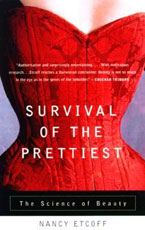"Every person knows the topography of her face and the landscape of her body as intimately as a mapmaker. To the outside world we vary in small ways from our best hours to our worst. In our mind's eye, however, we undergo a kaleidoscope of changes, and a bad hair day, a blemish, or an added pound undermines our confidence in ways that equally minor fluctuations in our moods, our strength, or our mental agility usually do not.
"People do extreme things in the name of beauty. They invest so much of their resources in beauty and risk so much for it, one would think that lives depended on it. In Brazil there are more Avon ladies than members of the army. In the United States more money is spent on beauty than on education or social services. Tons of makeup — 1,484 tubes of lipstick and 2,055 jars of skin care products — are sold every minute. During famines, Kalahari bushmen in Africa still use animal fats to moisturize their skin, and in 1715 riots broke out in France when the use of flour on the hair of aristocrats led to a food shortage. The hoarding of flour for beauty purposes was only quelled by the French Revolution.
"Either the world is engaged in mass insanity or there is method in this madness. Deep inside we all know something: no one can withstand appearances. We can create a big bonfire with every issue of Vogue, GQ, and Details, every image of Kate Moss, Naomi Campbell, and Cindy Crawford, and still, images of youthful perfect bodies would take shape in our heads and create a desire to have them. No one is immune. When Eleanor Roosevelt was asked if she had any regrets, her response was a poignant one: she wished she had been prettier. It is a sobering statement from one of the most revered and beloved of women, one who surely led a life with many satisfactions. She is not uttering just a woman's lament. In Childhood, Boyhood, Youth, Leo Tolstoy wrote, 'I was frequently subject to moments of despair. I imagined that there was no happiness on earth for a man with such a wide nose, such thick lips, and such tiny gray eyes as mine. . . . Nothing has such a striking impact on a man's development as his appearance, and not so much his actual appearance as a conviction that it is either attractive or unattractive.'
"Appearance is the most public part of the self. It is our sacrament, the visible self that the world assumes to be a mirror of the invisible, inner self. This assumption may not be fair, and not how the best of all moral worlds would conduct itself. But that does not make it any less true. Beauty has consequences that we cannot erase by denial. Beauty will continue to operate — outside jurisdiction, in the lawless world of human attraction. Academics may ban it from intelligent discourse and snobs may sniff that beauty is trivial and shallow but in the real world the beauty myth quickly collides with reality."
